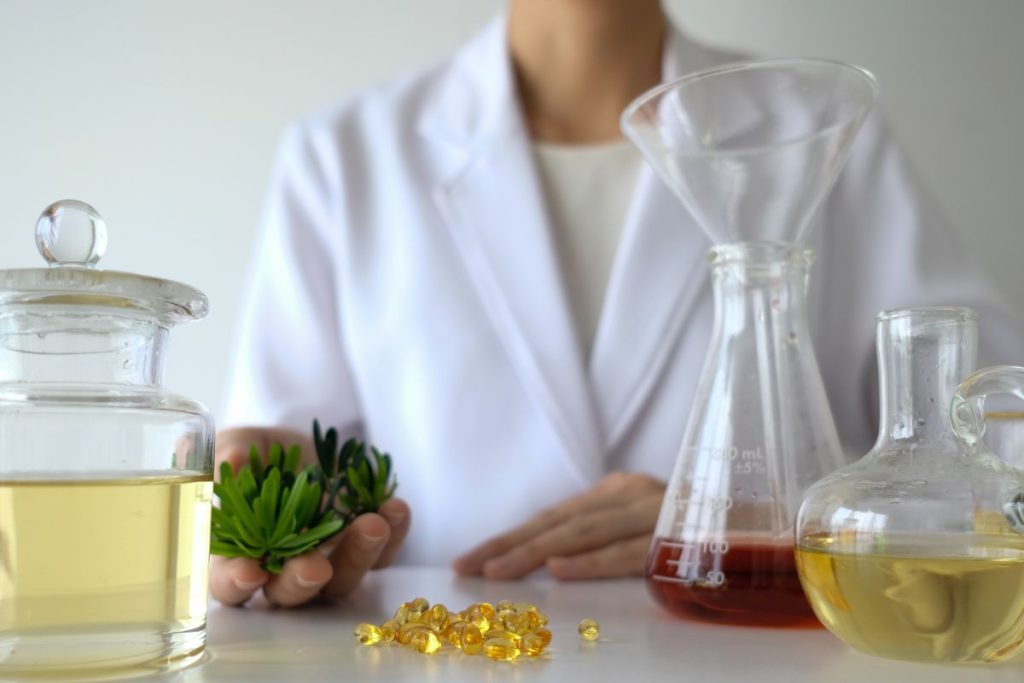Women use phytoestrogens and supplements to help ease hot flashes, improve sleep, improve mood, and reduce other menopause symptoms. They represent potential alternatives to hormone therapy but are not without risks. pausitive health examines the science, risks, and reported health benefits of popular herbal remedies for menopause.
Herbs for menopause
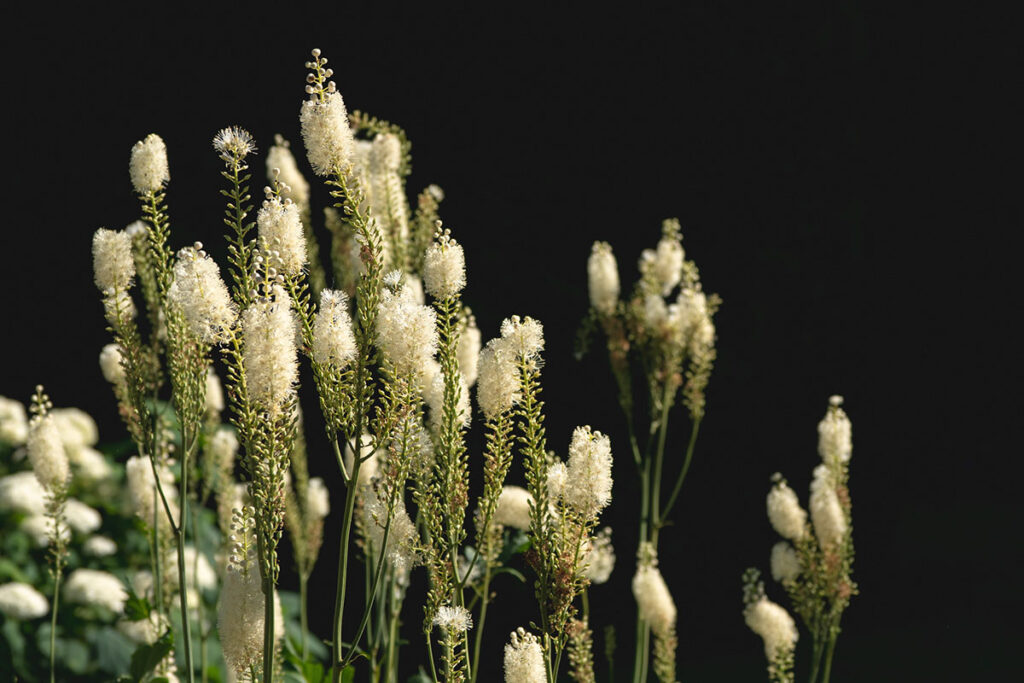
What is black cohosh?
Black cohosh menopause benefits
- hot flashes
- vaginal dryness
- osteoporosis – bone mineral density
- heart palpitations
- tinnitus
- vertigo
- sleep disturbances
- nervousness
- irritability
Clinical studies
- A 2012 review of 16 earlier studies found there’s not enough evidence to support the contention of an improvement in menopause symptoms. In the studies, women took between 8 to 160 mg/day with a 40 mg/day median dose. There was no difference in hot flashes between black cohosh and placebo.
- An Indian study found a black cohosh extract provided some benefits over a placebo, but not as much symptom relief as hormone therapy. The researchers noted more long-term clinical safety research is needed.
- A 2022 literature review of black cohosh found evidence supporting its benefits over placebo; it was not found to be significantly better than HT.
- Laboratory studies show black cohosh may have an estrogen-like effect, and prevent bone loss. If you’ve been diagnosed with osteoporosis, some medications can help.
Remifemin®
Recommendations for using black cohosh for menopause
Side effects of black cohosh
Liver damage warning
However, NCCIH cautions about potential liver damage in rare cases, although it’s unclear if the black cohosh caused the liver damage.
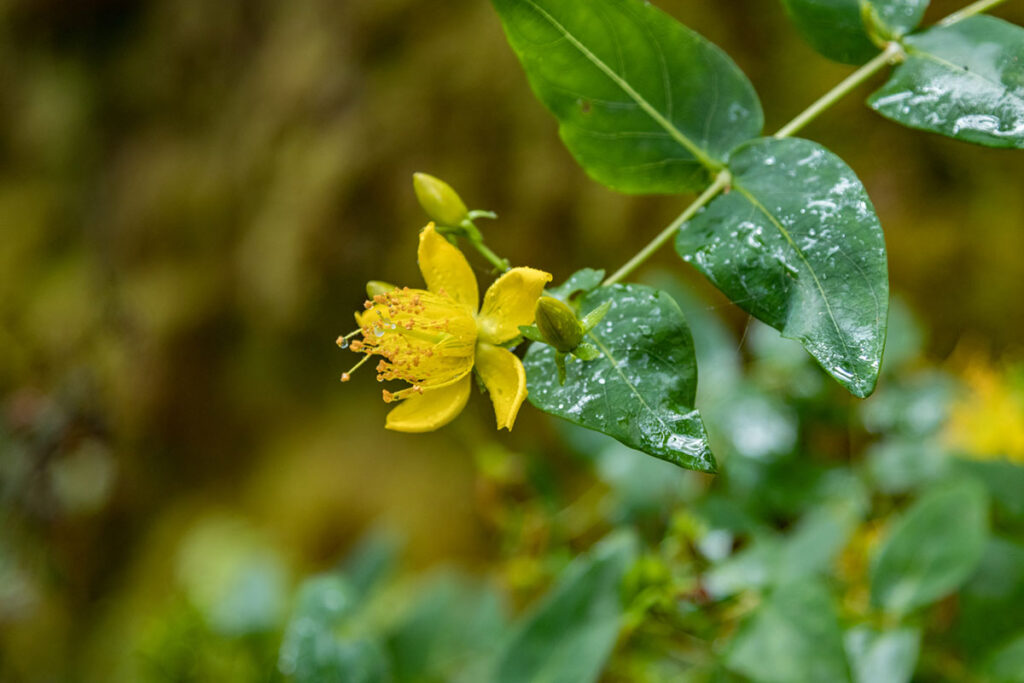
St. John’s Wort
St. John’s Wort and black cohosh may help hot flashes
Side effects
It can weaken the effects of other medicines, including:
- Antidepressants
- Birth control pills
- Cyclosporine
- Some heart medications
- Some HIV drugs
- Some cancer drugs
- Warfarin
- Some statins
Most studies focus on taking St. John’s wort for up to 12 weeks.
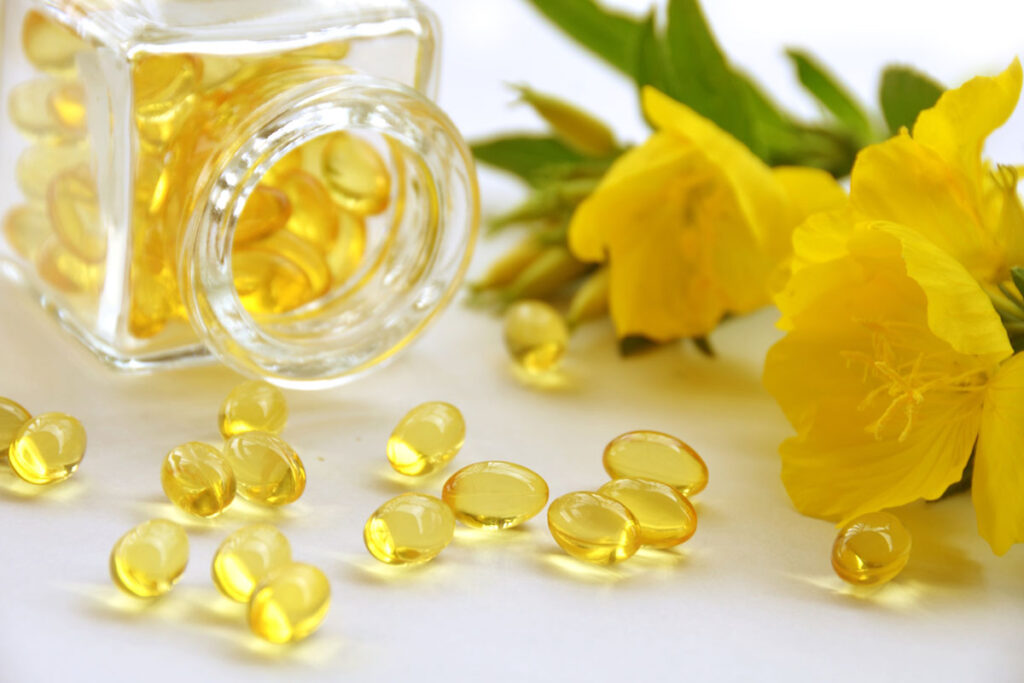
Evening Primrose
The bright yellow flower, evening primrose, is the plant used to create oils and supplements that many menopausal women take to relieve menopausal symptoms.
It’s also used for women during other stages of life, including premenstrual syndrome, to help with breast pain.
Benefits
People also take evening primrose oil for other conditions like eczema and rheumatoid arthritis.
While generally considered safe for adults, there is little evidence of its effectiveness.
Most studies have focused on evening primrose oil for eczema and breast pain. But, the NCCIH says there’s not enough evidence to support its use for any health condition.
Side effects
Side effects include temporary gastrointestinal symptoms like abdominal pain, fullness, diarrhea, and nausea. Inflammation, problems with blood clotting, and the immune system may also occur.
Evening primrose oil may also induce seizures in schizophrenic patients on antipsychotic medications. It should not be taken with anticoagulants or phenothiazines (a psychotherapeutic agent).
Drug interactions with herbs are always a concern, so talk with your doctor and check with a pharmacist.
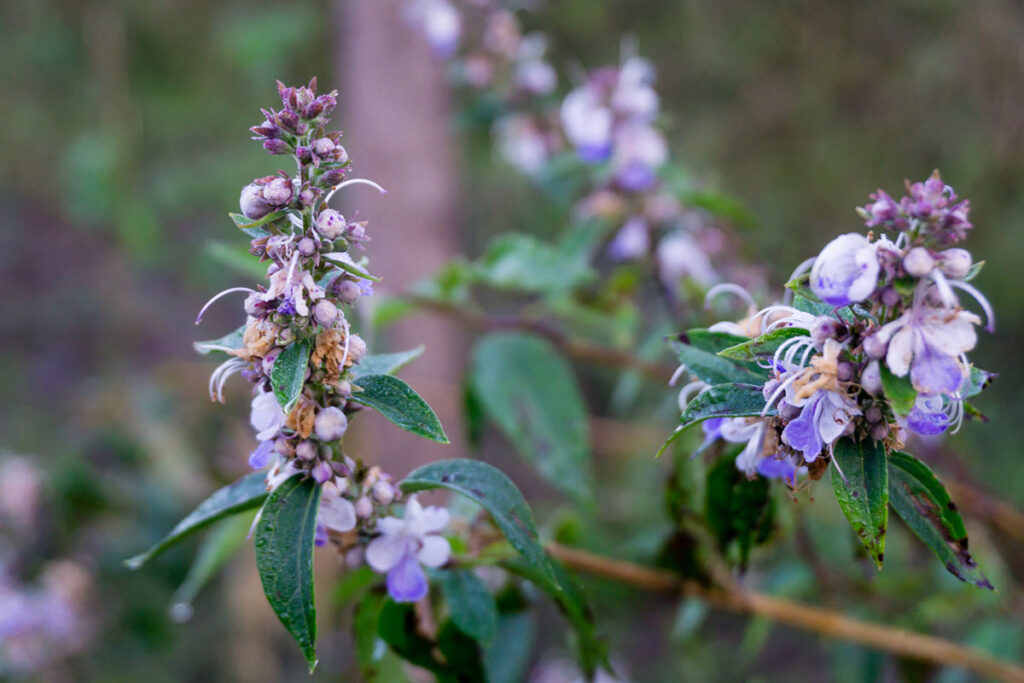
Vitex Agnus-Castus
Menopause benefits
Side effects
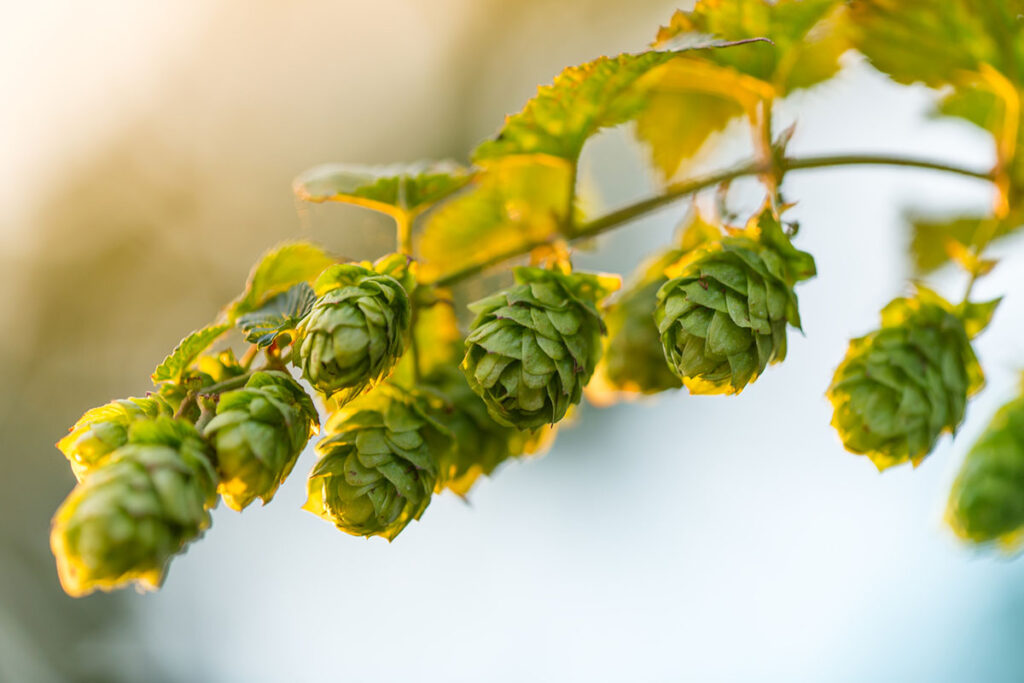
Can hops help with menopause symptoms?
Hops used for medicinal purposes are often found in powder or capsule form.
Hops may help with sleep
Hops and hot flashes
Hops and osteoporosis
Side effects
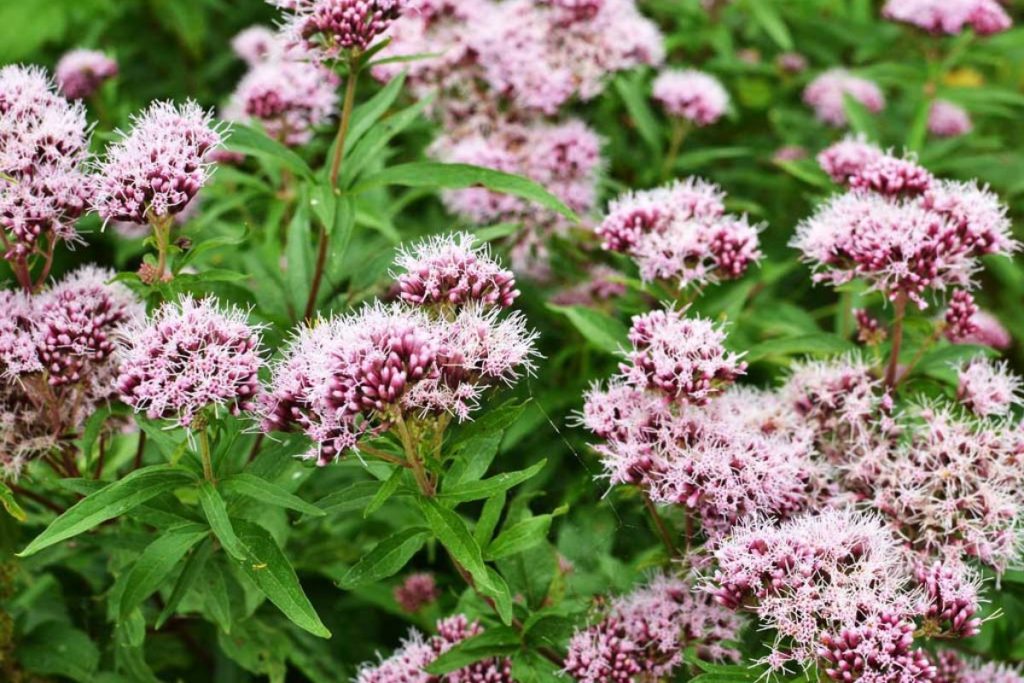
Valerian
Can valerian help you sleep better during menopause?
Valerian and hot flashes
Side effects
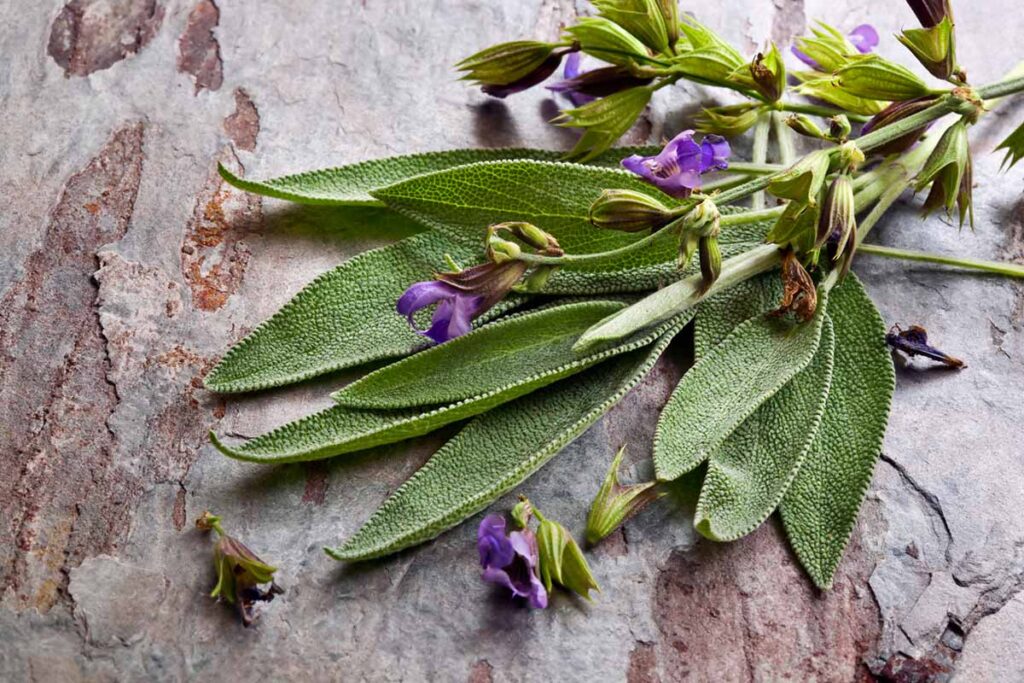
Sage
Sage hot flash benefits
-
Mild – 46%
-
Moderate – 62%
-
Severe – 79%
-
Very severe – 100%
Sage and seizure side effect
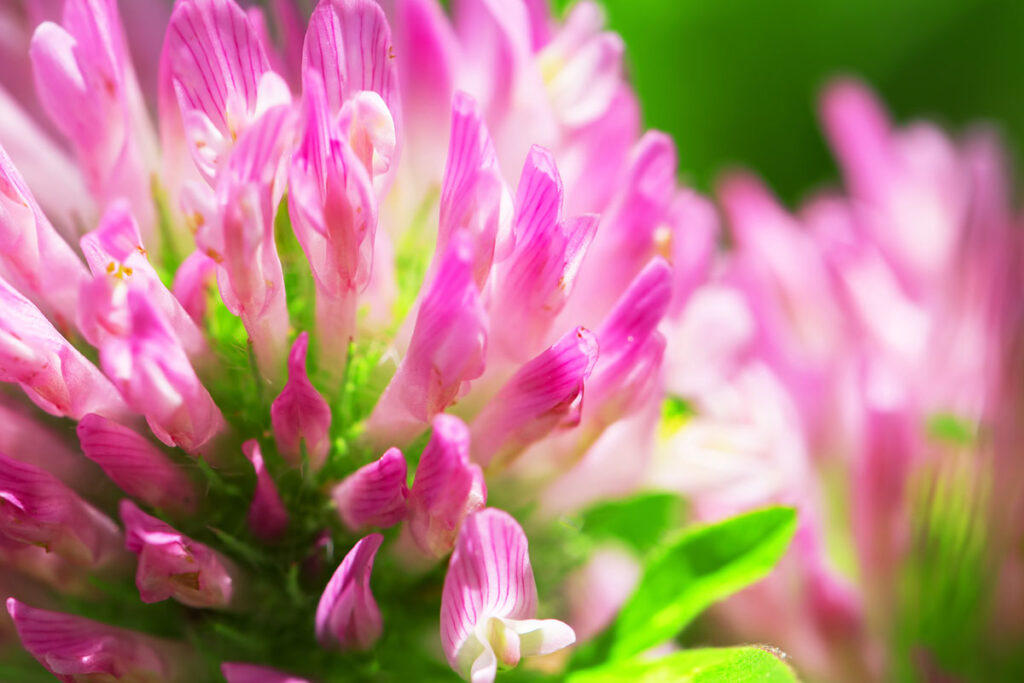
What is red clover?
It may look like a flower, but red clover is a legume, like peas and beans. It contains substances known as isoflavones, which are structurally related to estrogen.
Women use red clover supplements and teas to treat menopause symptoms, osteoporosis, and high cholesterol.
While the evidence is inconclusive and the Australian Menopause Society does not recommend women+ use it because of the lack of evidence, many women still take red clover. However, The Menopause Society, points out that women claim red clover helps them, and there are few side effects and serious health issues.
Post-menopausal studies
Some studies show benefits for post-menopausal women.
When taking red clover extract isoflavones, one study showed post-menopausal women saw improvement in:
- scalp hair
- skin status
- libido
- mood
- sleep
- energy
In another study, red clover reduced postmenopausal women’s daily vasomotor frequency and intensity.
Yet another, found fermented red clover can help slow bone loss.
Red clover and anxiety
Research studies often test red clover’s effectiveness with black cohosh or other soy isoflavones.
Compared to the placebo, there was no difference in vasomotor symptoms in a study of red clover and black cohosh extracts.
However, red clover significantly reduced anxiety over time, which women also experience during menopause along with other moodiness.
Red clover and osteoporosis
During menopause, women+ can lose up to 20% of their bone density.
The fermentation process makes the red clover stronger.
A laboratory study also showed positive effects on bone density.
Osteoporosis is often a silent disease until you experience a complication, so all women+ should try to prevent it with lifestyle changes like exercise and food rich in nutrients you need. You can also use medication to treat osteoporosis, although there is no cure.
Red clover and heart health
Heart health is a concern for women+ on the menopause journey. During the hormonal transition, a woman’s lipid profile (cholesterol and triglycerides) can change. It’s one cardiovascular risk during the menopause journey.
Some studies show red clover can help improve the cholesterol and triglycerides in peri and post-menopausal women. As a result, heart health can improve.
Red clover and hot flashes
Hot flashes are one of the most common symptoms of the menopause journey, but you may find relief with red clover.
In a study, red clover helped women+ with more than 5 hot flashes a day.
Side effects
There are potentially several menopausal benefits of red clover, and in most cases, side effects are minimal.
During trials, women took red clover for three years without any increased risks.
Red clover may not be safe, though, for menopausal women+ who have contraindications to the use of hormone therapy containing estrogen.
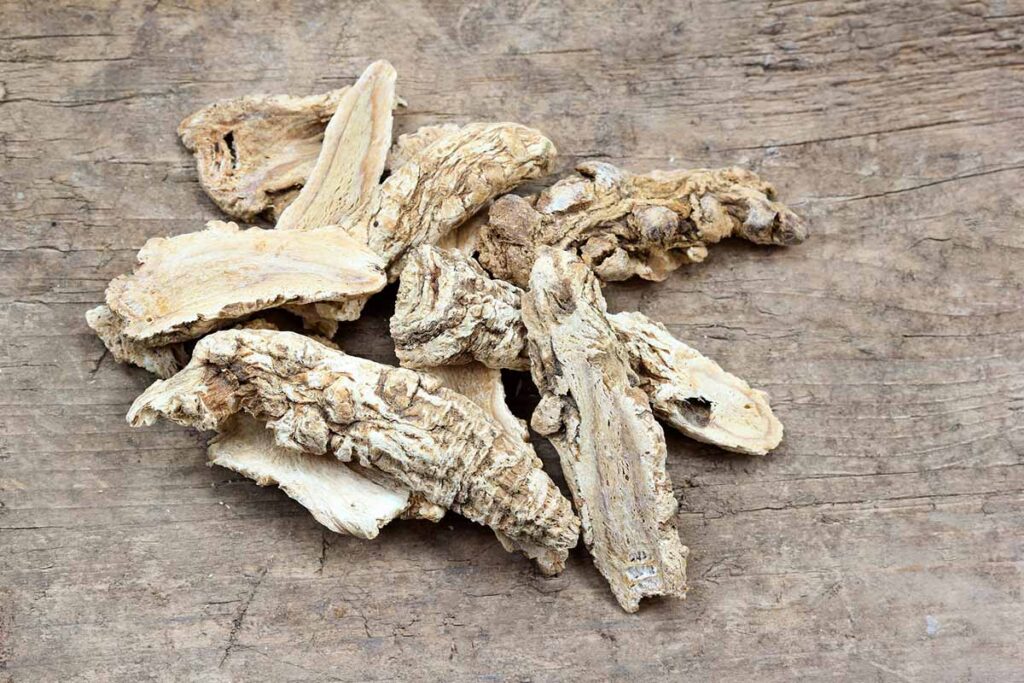
What is dong quai?
Research
Risks
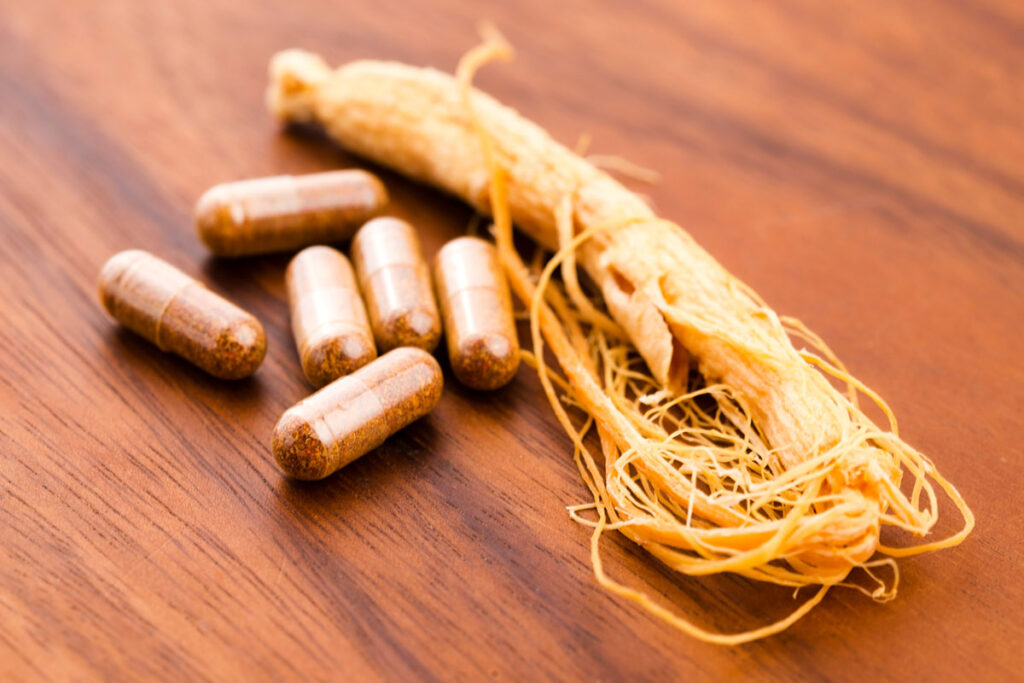
Ginseng
Benefits
Studies
Side effects
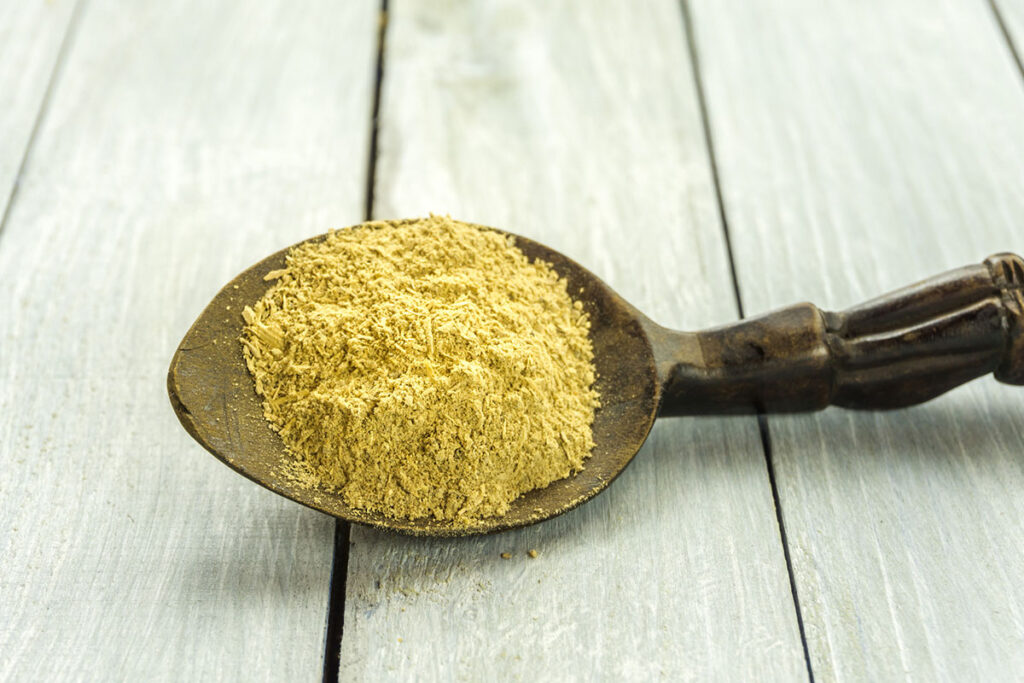
Kava
Research benefits
Potential liver damage
Guidance around the world
Always talk with your doctor being using herbal preparations.
Herbal medicine experts
How to find a naturopathic doctor
Black cohosh | National Institutes of Health
The Menopause Society. Nonhormonal management of menopause-associated vasomotor symptoms: 2015 position statement of The Menopause Society. Menopause: The Journal of The Menopause Society
Vol. 22, No. 11, pp. 1155-1174 doi: 10.1097/GME.0000000000000546
Leach MJ, Moore V. Black cohosh (Cimicifuga spp.) for menopausal symptoms. Cochrane Database Syst Rev. 2012 Sep 12;2012(9):CD007244. doi: 10.1002/14651858.CD007244.pub2. PMID: 22972105; PMCID: PMC6599854.
Mohapatra S, Iqubal A, Ansari MJ, Jan B, Zahiruddin S, Mirza MA, Ahmad S, Iqbal Z. Benefits of Black Cohosh (Cimicifuga racemosa) for Women Health: An Up-Close and In-Depth Review. Pharmaceuticals. 2022; 15(3):278. https://doi.org/10.3390/ph15030278
Mohapatra S, Iqubal A, Ansari MJ, Jan B, Zahiruddin S, Mirza MA, Ahmad S, Iqbal Z. Benefits of Black Cohosh (Cimicifuga racemosa) for Women Health: An Up-Close and In-Depth Review. Pharmaceuticals (Basel). 2022 Feb 23;15(3):278. doi: 10.3390/ph15030278. PMID: 35337076; PMCID: PMC8953734.
Qin Z, Dong Z, Liu J, Zhong A, Bao M, Wang H, Yu H, Zhang S, Zhang W, Shen L, Wu J, Chen J. A Preliminary Study on the Effects of Black Cohosh Preparations on Bone Metabolism of Rat Models With GnRH-a-Induced Peri-Menopausal Symptoms. Front Endocrinol (Lausanne). 2022 Jun 9;13:854345. doi: 10.3389/fendo.2022.854345. PMID: 35757412; PMCID: PMC9224413.
Osmers R., MD, PhD, Friede M., PhD, Liske, E., PhD, Schnitker, Joerg, PhD, Freudenstein J., PhD, Henneicke-von Zepelin H., PhD. Efficacy and Safety of Isopropanolic Black Cohosh Extract for Climacteric Symptoms. The American College of Obstetricians and Gynecologists. 2005 May. Vol 105, 5, 1. doi:10.1097/01.AOG.0000158865.98070.89
Black Cohosh | National Center for Complementary and Integrative Health
Cimicifugae rhizoma | European Medicines Agency
Summary of Data for Chemical Selection: Black cohosh | National Toxicology Program with the U.S. Department of Health and Human Services
Remifemin | Australian Government – Department of Health and Aged Care Therapeutic Goods Administration
Complementary medicine options for menopausal symptoms | Australian Menopause Society
Herb-Drug Interactions: What the Science Says – Black Cohosh | National Center for Complementary and Integrative Health
Uebelhack R, Blohmer JU, Graubaum HJ, Busch R, Gruenwald J, Wernecke KD. Black cohosh and St. John’s wort for climacteric complaints: a randomized trial. Obstet Gynecol. 2006 Feb;107(2 Pt 1):247-55. doi: 10.1097/01.AOG.0000196504.49378.83. PMID: 16449108.
Cheung AM. Black cohosh and St John’s wort reduced climacteric and depressive symptoms. Evid Based Med. 2006 Oct;11(5):148. doi: 10.1136/ebm.11.5.148. PMID: 17213150.
Briese V., Stammwitz U., Friede M., Henneicke-von Zepelin H. Black cohosh with or without St. John’s Wort for symptom-specific climacteric treatment – Results of a large-scale, controlled, observational study. Maturitas 57 (2007) 405-414. doi:10.1016/j.maturitas.2007.04.008
St. John’s Wort and Depression: In Depth | National Center for Complementary and Integrative Health
Evening Primrose Oil | National Center for Complementary and Integrative Health
What are the uses of primrose oil? | Healthline Media
Naseri R, Farnia V, Yazdchi K, Alikhani M, Basanj B, Salemi S. Comparison of Vitex agnus-castus Extracts with Placebo in Reducing Menopausal Symptoms: A Randomized Double-Blind Study. Korean J Fam Med. 2019 Nov;40(6):362-367. doi: 10.4082/kjfm.18.0067. Epub 2019 May 9. PMID: 31067851; PMCID: PMC6887765.
van Die MD, Burger HG, Bone KM, Cohen MM, Teede HJ. Hypericum perforatum with Vitex agnus-castus in menopausal symptoms: a randomized, controlled trial. Menopause. 2009 Jan-Feb;16(1):156-63. doi: 10.1097/gme.0b013e31817fa9e0. PMID: 18791483.
Salter S., Brownie S. Treating primary insomnia. Australian Family Physician. 2010 June. Vol 39. No 6.
Franco L., Sánchez C., Bravo R., Rodríguez A., Barriga C., Romero E., Cubero J. The Sedative Effect of Non-Alcoholic Beer in Healthy Female Nurses. 2012 July 18. https://doi.org/10.1371/journal.pone.0037290
Sun X, Xia T, Zhang S, Zhang J, Xu L, Han T, Xin H. Hops extract and xanthohumol ameliorate bone loss induced by iron overload via activating Akt/GSK3β/Nrf2 pathway. J Bone Miner Metab. 2022 May;40(3):375-388. doi: 10.1007/s00774-021-01295-2. Epub 2022 Feb 1. PMID: 35106609.
Bone Health and Postmenopausal Women | Endocrine Society
Erkkola R., Vervarcke S., Vansteedlandt S., Rompotti P., De Keukeleire D., Heyerick A. A randomized, double-blind, placebo-controlled, cross-over pilot study on the use of a standardized hop extract to alleviate menopausal discomforts. Phytomedicine. 2010 May. Vol. 17. Issue 6. Pgs 389-396. https://doi.org/10.1016/j.phymed.2010.01.007
Good news for menopausal women taking hop supplements: Tests show no drug interactions | Oregon State University
No level of alcohol consumption is safe for our health | World Health Organization
Taavoni, Simin MS1; Ekbatani, Neda BS1; Kashaniyan, Maryam MD2; Haghani, Hamid MS3. Effect of valerian on sleep quality in postmenopausal women: a randomized placebo-controlled clinical trial. Menopause 18(9):p 951-955, September 2011. | doi: 10.1097/gme.0b013e31820e9acf
Mirabi P, Mojab F. The effects of valerian root on hot flashes in menopausal women. Iran J Pharm Res. 2013 Winter;12(1):217-22. PMID: 24250592; PMCID: PMC3813196.
Sage | National Center for Complementary and Integrative Health
Bommer S, Klein P, Suter A. First time proof of sage’s tolerability and efficacy in menopausal women with hot flushes. Adv Ther. 2011 Jun;28(6):490-500. doi: 10.1007/s12325-011-0027-z. Epub 2011 May 16. PMID: 21630133.
Geller SE, Shulman LP, van Breemen RB, Banuvar S, Zhou Y, Epstein G, Hedayat S, Nikolic D, Krause EC, Piersen CE, Bolton JL, Pauli GF, Farnsworth NR. Safety and efficacy of black cohosh and red clover for the management of vasomotor symptoms: a randomized controlled trial. Menopause. 2009 Nov-Dec;16(6):1156-66. doi: 10.1097/gme.0b013e3181ace49b. PMID: 19609225; PMCID: PMC2783540.
Lipovac M, Chedraui P, Gruenhut C, Gocan A, Kurz C, Neuber B, Imhof M. Effect of Red Clover Isoflavones over Skin, Appendages, and Mucosal Status in Postmenopausal Women. Obstet Gynecol Int. 2011;2011:949302. doi: 10.1155/2011/949302. Epub 2011 Nov 1. PMID: 22135679; PMCID: PMC3206499.
Lipovac M, Chedraui P, Gruenhut C, Gocan A, Kurz C, Neuber B, Imhof M. The effect of red clover isoflavone supplementation over vasomotor and menopausal symptoms in postmenopausal women. Gynecol Endocrinol. 2012 Mar;28(3):203-7. doi: 10.3109/09513590.2011.593671. Epub 2011 Aug 26. PMID: 21870906.
Powles TJ, Howell A, Evans DG, et al. Red clover isoflavones are safe and well tolerated in women with a family history of breast cancer. Menopause International. 2008;14(1):6-12. doi:10.1258/MI.2007.007033
Luís Â, Domingues F, Pereira L. Effects of red clover on perimenopausal and postmenopausal women’s blood lipid profile: A meta-analysis. Climacteric. 2018 Oct;21(5):446-453. doi: 10.1080/13697137.2018.1501673. PMID: 30269660.
Ghazanfarpour M, Sadeghi R, Roudsari RL, Khorsand I, Khadivzadeh T, Muoio B. Red clover for treatment of hot flashes and menopausal symptoms: A systematic review and meta-analysis. J Obstet Gynaecol. 2016;36(3):301-11. doi: 10.3109/01443615.2015.1049249. Epub 2015 Oct 15. PMID: 26471215.
Occhiuto F, Pasquale RD, Guglielmo G, Palumbo DR, Zangla G, Samperi S, Renzo A, Circosta C. Effects of phytoestrogenic isoflavones from red clover (Trifolium pratense L.) on experimental osteoporosis. Phytother Res. 2007 Feb;21(2):130-4. doi: 10.1002/ptr.2037. PMID: 17117453.
Scientist: Osteoporosis can be prevented with red clover | Science Nordic
Do Mother Nature’s Treatments Help Hot Flashes? | The North American Menopause Society (now The Menopause Society)
Lee HW, Choi J, Lee Y, Kil KJ, Lee MS. Ginseng for managing menopausal woman’s health: A systematic review of double-blind, randomized, placebo-controlled trials. Medicine (Baltimore). 2016 Sep;95(38):e4914. doi: 10.1097/MD.0000000000004914. PMID: 27661038; PMCID: PMC5044908.
Kim HI, Chon SJ, Seon KE, Seo SK and Choi Y-R (2021) Clinical Effects of Korean Red Ginseng in Postmenopausal Women With Hand Osteoarthritis: A Double-Blind, Randomized Controlled Trial. Front. Pharmacol. 12:745568. doi: 10.3389/fphar.2021.745568
Kim SY, Seo SK, Choi YM, Jeon YE, Lim KJ, Cho S, Choi YS, Lee BS. Effects of red ginseng supplementation on menopausal symptoms and cardiovascular risk factors in postmenopausal women: a double-blind randomized controlled trial. Menopause. 2012 Apr;19(4):461-6. doi: 10.1097/gme.0b013e3182325e4b. PMID: 22027944.
Asian Ginseng | National Center for Complementary and Integrative Health
Ginseng Interactions | Drugs.com
Kava | National Center for Complementary and Integrative Health
De Leo V, La Marca A, Lanzetta D, Palazzi S, Torricelli M, Facchini C, Morgante G. Valutazione dell’associazione di estratto di Kava-Kava e terapia ormonale sostitutiva nel trattamento d’ansia in postmenopausa [Assessment of the association of Kava-Kava extract and hormone replacement therapy in the treatment of postmenopause anxiety]. Minerva Ginecol. 2000 Jun;52(6):263-7. Italian. PMID: 11085051.
De Leo V, la Marca A, Morgante G, Lanzetta D, Florio P, Petraglia F. Evaluation of combining kava extract with hormone replacement therapy in the treatment of postmenopausal anxiety. Maturitas. 2001 Aug 25;39(2):185-8. doi: 10.1016/s0378-5122(01)00197-9. PMID: 11514117.
Registered Herbalists | American Herbalists Guild
Naturopathic Medicine FAQs | Institute for Natural Medicine
Find an ND | American Association of Naturopathic Physicians
You may also like…
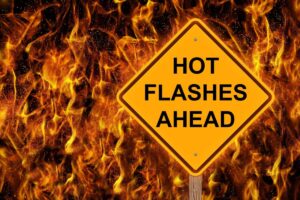
LYNKUET: A New Option for Hot Flash Relief
A new non-hormonal medication, LYNKUET™ (elinzanetant) offers relief for women+ who experience menopause-related hot flashes. Learn how it works.
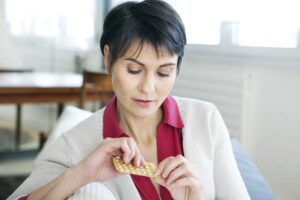
Hormone-Free Hot Flash Relief: 12 Non-Hormonal Medications To Try
Want to beat the heat from hot flashes hormone-free? Try these non-hormonal hot flash medications that are FDA-approved or used off-label.

Yoga For Lifelong Strength: 5 Yoga Types To Power Through Daily Life
Yoga can provide lifelong strength. Learn about 5 yoga types and the benefits so you can power through daily life.

